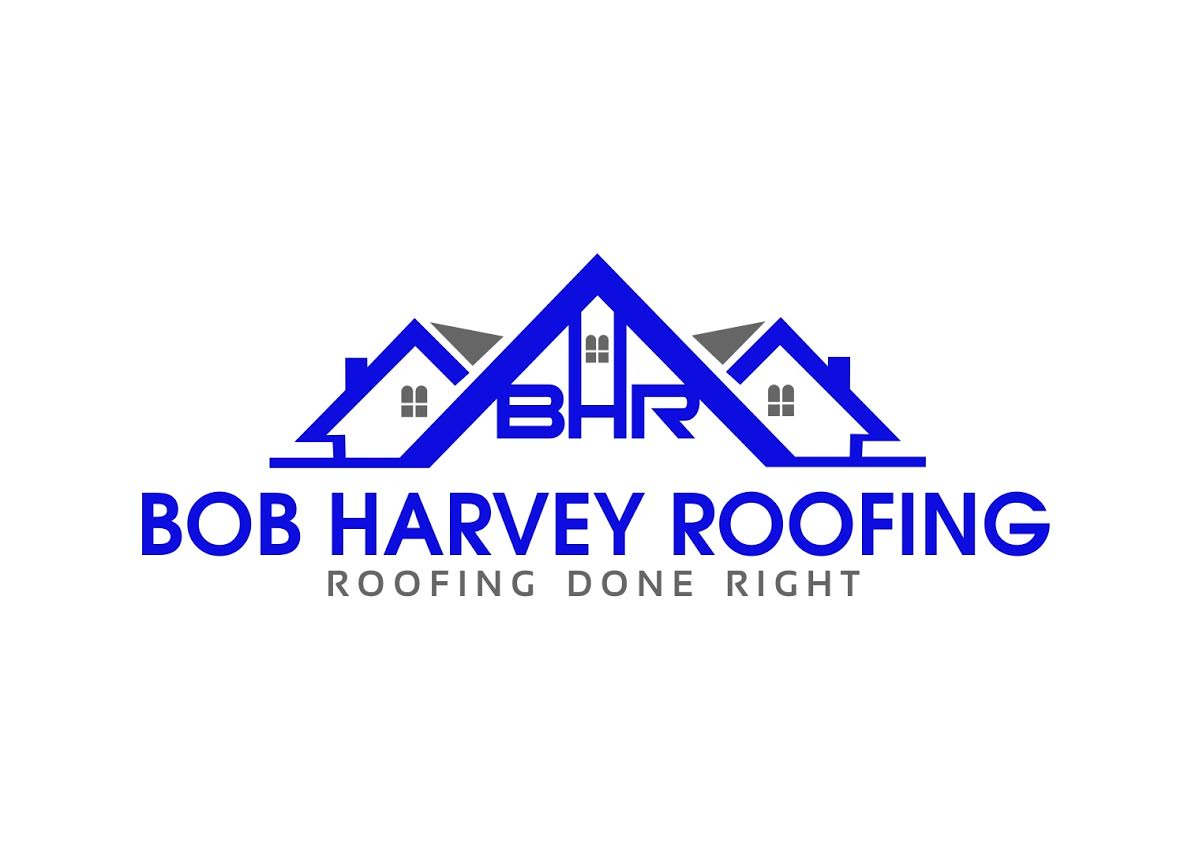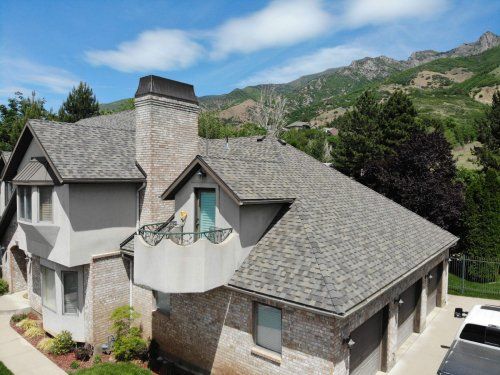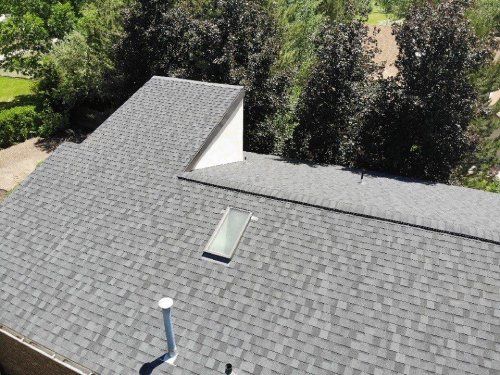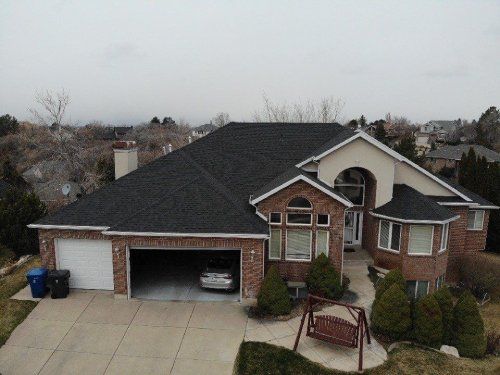Residential and Commercial Asphalt Shingles
Bob Harvey Roofing is a professional roofing contractor in Northern Utah and has been in business for more than thirty years. We install asphalt shingles on residential and commercial properties. Bob Harvey Roofing is licensed and fully insured.
When we install asphalt roof shingles on a commercial or residential property, we do a full-roof installation that includes materials and labor.
What are asphalt shingles?
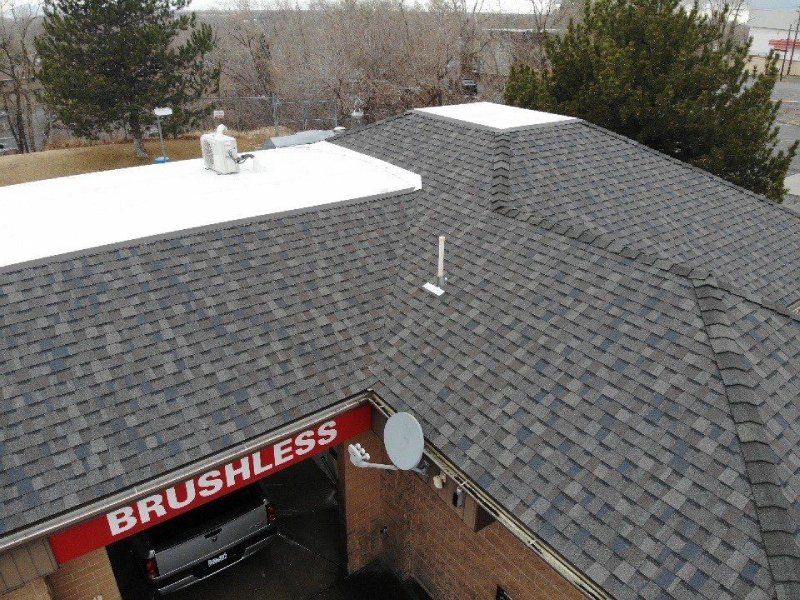
Asphalt shingles are sometimes known as composite shingles. It is a composite product made from a fiberglass or cellulose mat, asphalt and mineral granules. It is also fully recyclable. There are three types of asphalt shingles:
- Strip asphalt roofing shingles with a very flat appearance that looks like slate.
- Dimensional asphalt roofing shingles have a richer and thicker multi-dimensional appearance.
- Luxury asphalt roofing shingles look like old-world shake and quarried slate roofing.
Asphalt shingles are naturally fire-resistant. Specialty shingles that fight algae growth, have cool roof color technologies, or enhanced resistance to damaging hail can be manufactured. They are available across all shingle types.
Asphalt roofing shingles have a one-hundred-year
proven track record in North America. Bob Harvey Roofing is an accredited CertainTeed Select Shingle Master.
Try our Roofing Costs Calculator
The Roofing Cost Calculator is not a quote and does not create a binding agreement between Bob Harvey Roofing and the website user.
WHY USE BOB HARVEY ROOFING?
Bob Harvey Roofing promises fair pricing and organized, courteous contractors. We have multiple crews to fit any size project. All asphalt shingles installers are employed by our company and have professional experience. We do not use subcontractors.
How does the asphalt shingles installation process work?
When a client wants to install commercial asphalt shingles or the best residential asphalt shingles on their roof, we inspect and measure the project. Then we present options to the owner, followed by a pre-job meeting. All crews are supervised during installation, and after a final quality inspection, we give the owner a walkthrough.
A top-level member of our management team does final quality inspections. Bob Harvey Roofing also documents and photographs every job. We completed asphalt shingle roofing projects on numerous large private custom homes.
WARRANTIES
Lifetime Limited Warranties are available on asphalt shingles roofing installations. CertainTeed's residential lifetime limited warranty includes full system coverage and the Sure Start coverage is double the length of the standard manufacturer’s warranty.
Extended warranty options are available through the manufacturer. Asphalt shingles are warranted for up to one hundred and ten miles per hour winds.
Bob Harvey Roofing is a member of the Utah Roofing Contractors Association (URCA), a Business Network International (BNI) member, and has an A+ rating with the Better Business Bureau (BBB). Are you a property owner, homeowner, property manager, or realtor? Need to have asphalt shingles installed on a commercial or residential roof? Contact Bob Harvey Roofing today.
FAQs
Everything you want to know about Asphalt Shingles
1. What are asphalt shingles made of?
Asphalt shingles consist of a base mat made from organic materials or fiberglass, saturated with asphalt for waterproofing. The top layer is coated with mineral granules that provide color and protect against UV rays.
2. How long do asphalt shingles typically last?
The lifespan of asphalt shingles ranges from 15 to 30 years, depending on factors like material quality, installation, maintenance, and environmental conditions. Regular inspections and upkeep can help maximize their longevity.
3. Are asphalt shingles suitable for Utah's climate?
Yes, asphalt shingles are well-suited for Utah's diverse climate. They can withstand temperature fluctuations, snow, and UV exposure. Selecting high-quality shingles and ensuring proper installation are crucial for optimal performance.
4. What are the different types of asphalt shingles?
The primary types are:
- Three-tab shingles: Flat, uniform shingles with a single layer, offering a traditional look.
- Architectural (dimensional) shingles: Thicker, multi-layered shingles that provide a more textured appearance and enhanced durability.
5. How do I maintain my asphalt shingle roof?
Regular maintenance includes:
- Inspecting for damaged or missing shingles.
- Cleaning gutters to prevent water buildup.
- Removing debris and moss from the roof surface.
- Scheduling professional inspections annually to identify potential issues early.
6. Can asphalt shingles be installed over an existing roof?
In some cases, asphalt shingles can be installed over one existing layer, provided the underlying roof is in good condition. However, it's often recommended to remove old shingles to inspect the roof deck and ensure proper installation.
7. Are asphalt shingles environmentally friendly?
Asphalt shingles are petroleum-based and have a shorter lifespan compared to some materials, leading to more frequent replacements. However, many manufacturers are now offering recycling programs to repurpose old shingles, reducing environmental impact.
8. Do asphalt shingles offer good fire resistance?
Fiberglass asphalt shingles typically have a Class A fire rating, indicating excellent fire resistance. Organic-mat shingles usually have a Class C rating. Always verify the fire rating when selecting shingles for your roof.
9. How do asphalt shingles perform in high winds?
High-quality asphalt shingles can withstand winds up to 130 mph, especially when properly installed. Choosing shingles with a high wind resistance rating and ensuring correct installation are vital for performance in windy areas.
10. What are the signs that my asphalt shingle roof needs replacement?
Indicators include:
- Curling, cracking, or missing shingles.
- Granule loss, evident in gutters or on the ground.
- Leaks or water stains inside the home.
- Sagging roof deck.
- If you notice these signs, it's advisable to consult a professional roofer for an assessment.
